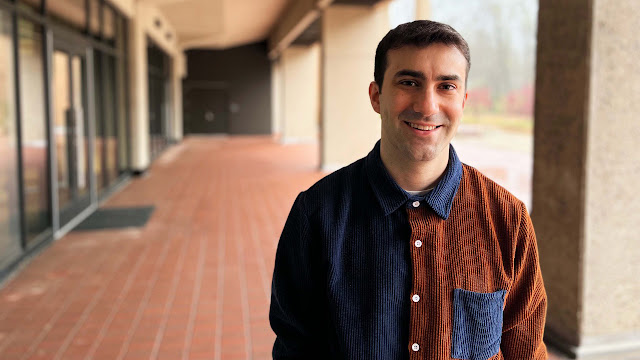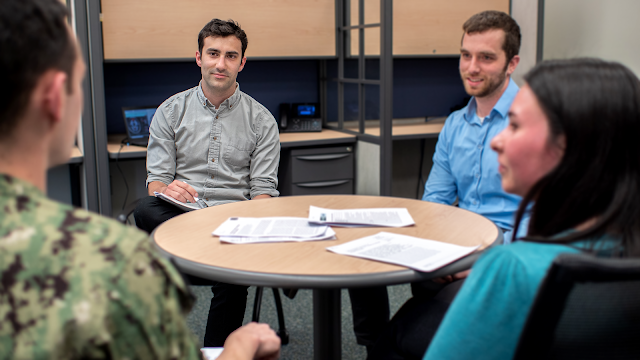USU Program Helps Student Give Back to Those Who Supported Him
By Ian Neligh
Where we come from can often define our future.
For Matthew Thompson, the inspiration to attend the Uniformed Services University of the Health Sciences (USU) to become a clinical psychologist came from the communities that supported him over the years — and a strong desire to give back.
Thompson is one of a handful of civilian students accepted into the military university’s prestigious Medical and Clinical Psychology (MPS) doctoral degree program.
Currently in his fourth year of schooling, Thompson says his inspiration to go into psychology and researching suicide prevention comes from his drive to help military and veteran populations — much like the ones prominent in the small Massachusetts town he grew up in. Thompson, who has been actively involved in the university’s LGBTQ+ student interest group, Spectrum, says he is also motivated to help those in the LGBTQ+ communities.
“I’ve always been interested in doing work that feels meaningful to me and doing work that feels like I’m giving back to the communities that I come from,” Thompson says.
Work to be done
Thompson is from the town of Oxford, Mass. located about an hour and a half away from Boston. Growing up, he says he had dreams of someday working for the government.
“When I was a kid, I’d say, like, I wanted to be president — there were always big government
aspirations, but that was when I was really young,” Thompson says. “As I grew older, as a senior in high school, I was split between wanting to do international relations and neuroscience. Those were the two things I was most interested in.”
“I’ve always just been interested in learning more about why we behave how we behave, why we do what we do, why we think what we think,” Thompson says.
While in college, Thompson worked, sometimes three or four part-time jobs at the same time, in addition to doing his studies and lab work.
“I’m grateful to all of my bosses who understood where I was coming from. If there were down times at [the home improvement store] the bosses would let me study under the cash register — or there would be co-workers who would quiz me if I had an exam the next day,” Thompson says. “There’s a ton of people who have helped me get to where I am and continue to help.”
The neuroscience program at his school ended up closing so Thompson focused his efforts in psychology and ended up double majoring in psychology and biology, getting his master’s degree in biology working in a neuroscience lab.
“As an undergrad volunteering at mental health sites I kind of saw how much need there was and how much work needs to be done — and I think that is something which has motivated me throughout all of my work,” Thompson says.
He then worked for three years as a research coordinator for Brown University at the Providence VA Medical Center on a suicide prevention trial with veterans.
“And that’s what got me solidified on the idea that psychology was the area for me, specifically clinical psychology, working with patient populations,” Thompson says. “It was really impactful for me to see that interventions, that are based on science, can impact people in real ways.”
Thompson says he remembers working with veterans who he’d see while they were inpatient, and often at their lowest point.
“With just brief interventions we would see them a few months later and they would be leading very fulfilling lives and were very appreciative,” Thompson says.
Tangible outcomes
Around that same time, his supervisor told him about USU’s Suicide Care, Prevention and Research Initiative, established in 2006, which focuses on the issue of military suicide.
“The research atmosphere was exactly what I was looking for,” Thompson says. “Just seeing the uniqueness of the students and faculty at USU really solidified it for me. Instantly I saw it as a collaborative environment and environment where everyone comes in with very unique strengths and shares those strengths.”
The students at USU are predominantly military and Thompson jokes that everyone wearing uniforms was the first thing he noticed as a civilian student.
“I don’t think I ever paid so much attention to what I wore — I was around people in military uniforms all day,” Thompson says. “My friends joke that during the second year I started wearing more green.”
He says in his first year his fellow students, or cohort, helped him and the other civilian students get up to speed with military culture and customs.
“There’s the initial little bit of culture shock but that faded pretty quickly,” Thompson says.
Thompson says one of the most impactful things he’s noticed in the military system is that there’s a focus on tangible outcomes and tangible solutions in both clinical and research work.
“Within the civilian sector, in classes and in their research, they can get a little more theoretical and they don’t have the same tangible outcomes,” Thompson says. “I think I like the military system a lot better because it feels like it’s leading to something — and for my research it just made me feel like there’s a real end product.”
He says it’s inspiring to know that he’s on a career path that helps the communities that mean something to him.
“And having my support system - my professional support system of my cohort and advisors, but also friends and family who have helped me along the way – those are all areas that are inspirational and help me keep going and stay grounded.”
Thompson says after graduating he plans to continue to spend his time finding ways to help people.
“I'd love to work as a psychologist within the VA system, doing a combination of clinical work and research that ultimately help to address suicide prevention within veterans and military populations.”







